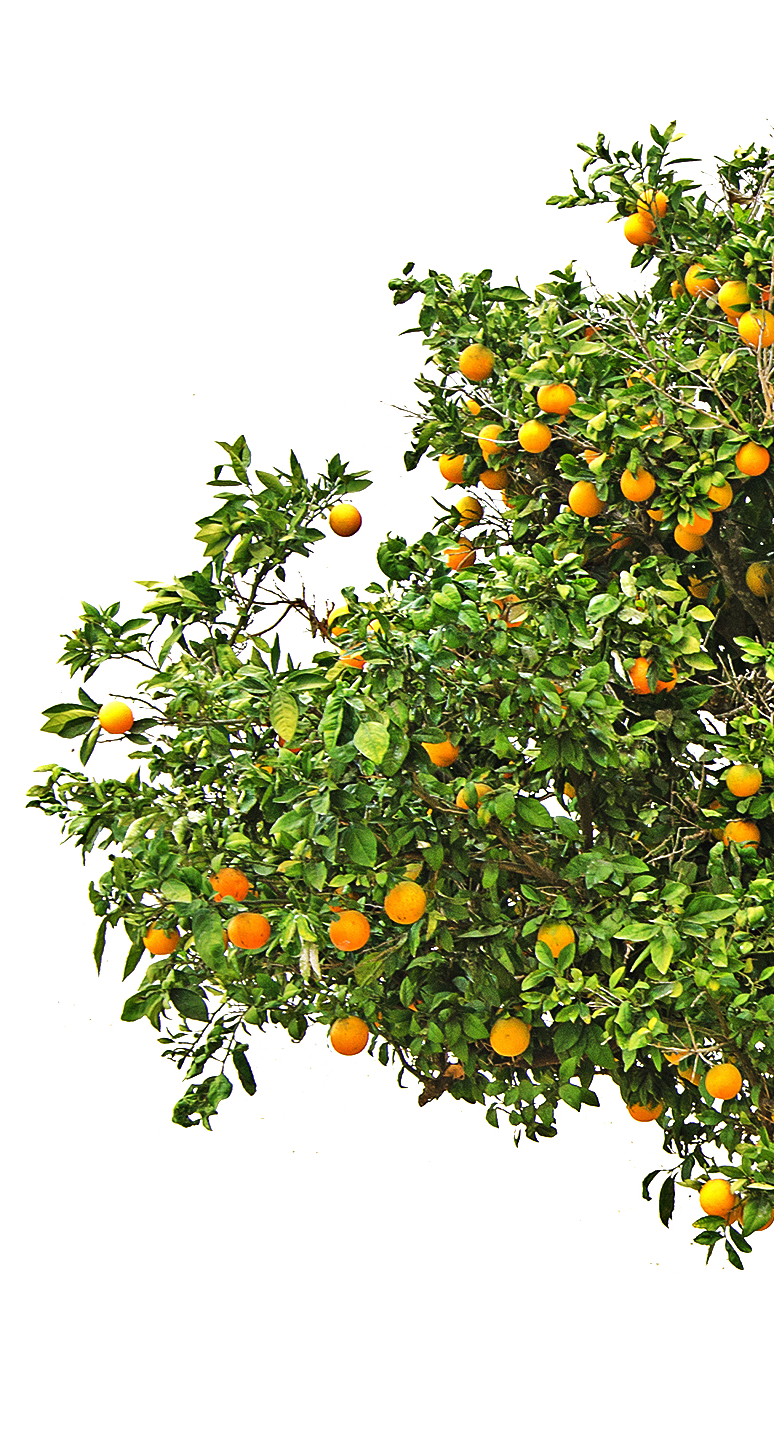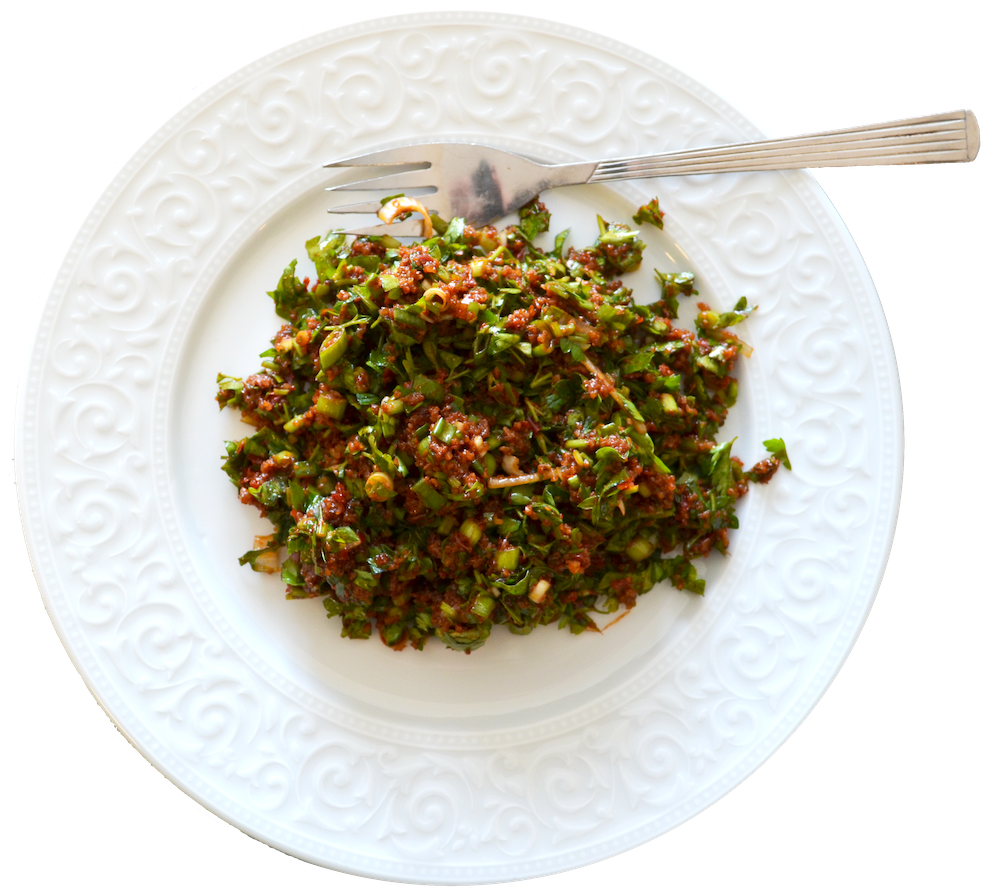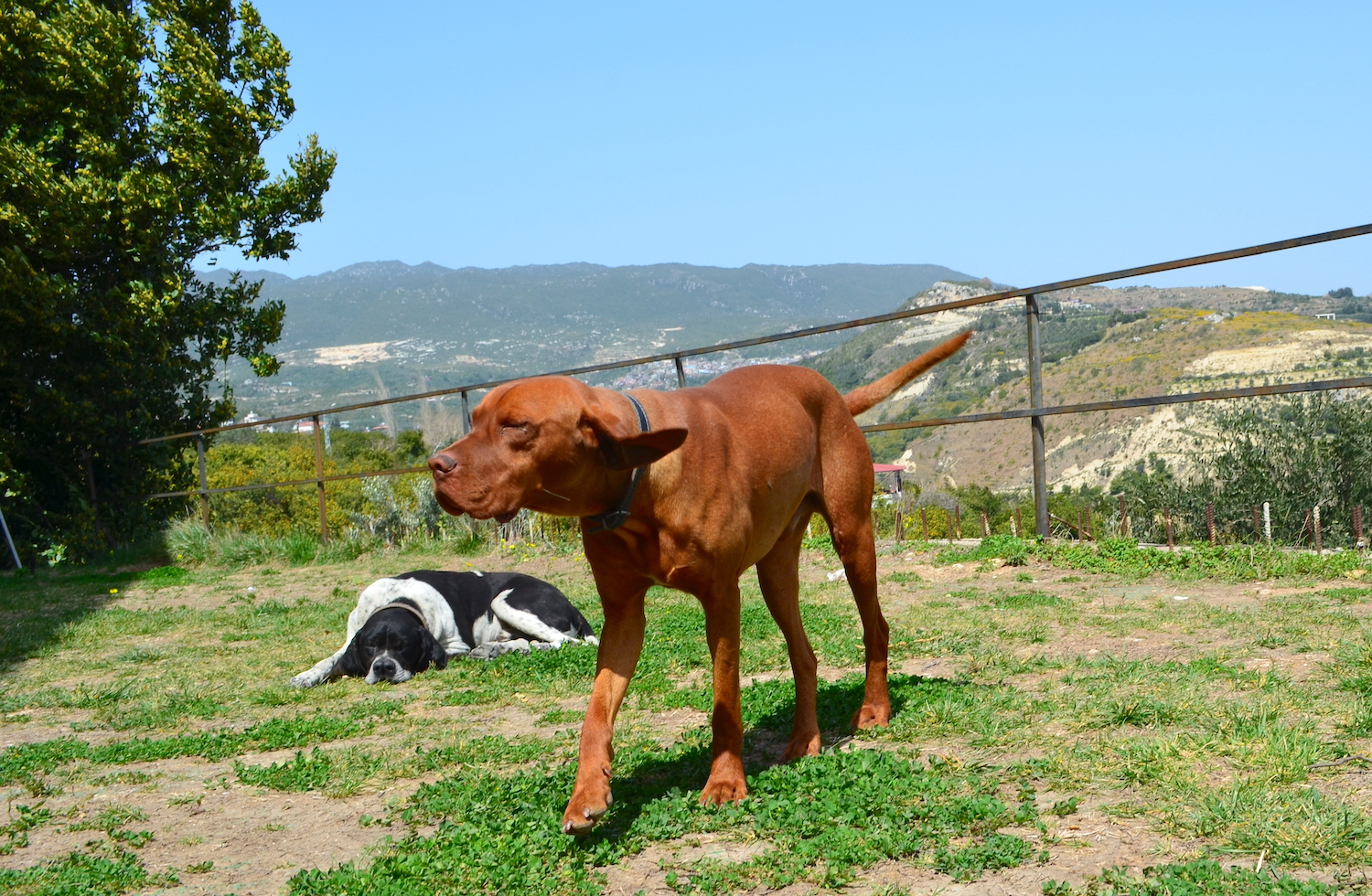The last Armenian village in Turkey, Vakıflı Village, is a place where Armenian is still spoken with parpar and where customs are preserved. We visited Vakıflı Village with our friend Arican in the first week of April with some touristic intentions, but we were also considering whether we could do interviews there.
When we began the Panavor project, our initial goal was to interview people in Istanbul who could provide us with in-depth information regarding culinary memory. After that, we wanted to speak with Armenians in the diaspora via online platforms. Nevertheless, during the course of the study, we had the opportunity to visit Vakıflı Village and have in-person interviews there. We both had no idea that the Vakıflı Village we visited for just a couple of days would leave such an impression on us.
There’s a village far away: The last village of us, Armenians
պլօկ
Entering to the Village
When you enter the village, you will be greeted by the inscription “Welcome to Musa Ler, Vakıflı Village” in four different languages on your right. Reading an inscription in Armenian letters on a wall outside Istanbul was a bit like discovering something that was once lost. Just ahead of the stone, you see the village’s coffee house. The old men were sitting in front of the coffee house playing backgammon, we immediately approached them and said ‘parev’. Saying ‘parev’ to someone you don’t know is actually an action that has many meanings in it, something like a code or a secret contract… As a matter of fact, everyone we call ‘parev’ was aware of this secret contract. We quickly connected with them and had long conversations about where we came from, what we came for, where we were staying, and who we were. These conversations took place occasionally at the village’s coffee house or on Vakıflı’s sloped roads, or at the hostel’s garden where we stayed. The majority of the people we encountered in the village had their roots in Vakıflı, but there were also brides from Sasun who had moved there later and a family who had fled the Syrian Civil War. We, as three friends, stayed in the hostel just to the right of the church. In addition to being close to the church, everyone seemed to visit the hostel during the day for various purposes.
The scent of fruit trees and oranges
Vakıflı Village is a place with lots of trees, where you can hear water running in every corner, and, perhaps most fascinatingly, where everything smells like oranges and lemons. We knew that we grew up too distant from nature as we were born and raised in Istanbul, but when we got to Vakıflı, we realized how tasteless the fruits in Istanbul were. The first thing you notice when you arrive in the village is how green it is. Each garden has a variety of fruit trees, and if you are a guest of the village, all the trees and all the fruits on them are yours. Every garden owner has permission for you to pluck them all.
In the village, we plucked oranges and tangerines from almost every tree we came across. During the time we spent in Vakıflı, we learned that even though the types vary, oranges are grown in the village almost every season. On our first day in the village, we were having lunch at the Musa Dagh Restaurant, which was a little further away from the church. Arman, one of the restaurant’s employees, greeted us and we had a lengthy conversation. Because of the lands we were born in, we are all inherently a little more hospitable than others, but the people of Vakıflı go above and beyond that. That’s exactly how Arman was! He approached us after dinner and said, “I’ll bring you something,” before heading for the fruit trees. In all honesty, I was anticipating liquor, which did arrive eventually, but Arman rather came to the table holding oranges. “These blood oranges are in their last harvest,” he said, “Please taste it. The orange was the tastiest one we’ve ever eaten!
We made the decision to use our newly gained orange-picking skills in Vakıflı. In our final days, we went down to Eda Kuyrig’s garden, whom we had met through the cooperative, in the early hours of the morning. They were not sure whether we would wake up in the morning and help them. But that day, we got up and picked several kilograms of oranges. There, we learned that workers from the nearby villages used to come for the harvest, and even before, these employees’ sole source of revenue was the improperly picked oranges. It was required to gather the oranges at a specific angle because if you pulled them straight down, the oranges’ heads would be cut off and they would be delivered to the workers for that day’s salary. They told us that some people even take advantage of this circumstance. My gains that day were quite plentiful, even though I had no intention of abusing them!
Vakıflı Village is a place with lots of trees, where you can hear water running in every corner, and, perhaps most fascinatingly, where everything smells like oranges and lemons. We knew that we grew up too distant from nature as we were born and raised in Istanbul, but when we got to Vakıflı, we realized how tasteless the fruits in Istanbul were. The first thing you notice when you arrive in the village is how green it is. Each garden has a variety of fruit trees, and if you are a guest of the village, all the trees and all the fruits on them are yours. Every garden owner has permission for you to pluck them all.

In the village, we plucked oranges and tangerines from almost every tree we came across. During the time we spent in Vakıflı, we learned that even though the types vary, oranges are grown in the village almost every season. On our first day in the village, we were having lunch at the Musa Dagh Restaurant, which was a little further away from the church. Arman, one of the restaurant’s employees, greeted us and we had a lengthy conversation. Because of the lands we were born in, we are all inherently a little more hospitable than others, but the people of Vakıflı go above and beyond that. That’s exactly how Arman was! He approached us after dinner and said, “I’ll bring you something,” before heading for the fruit trees. In all honesty, I was anticipating liquor, which did arrive eventually, but Arman rather came to the table holding oranges. “These blood oranges are in their last harvest,” he said, “Please taste it. The orange was the tastiest one we’ve ever eaten!
We made the decision to use our newly gained orange-picking skills in Vakıflı. In our final days, we went down to Eda Kuyrig’s garden, whom we had met through the cooperative, in the early hours of the morning. They were not sure whether we would wake up in the morning and help them. But that day, we got up and picked several kilograms of oranges. There, we learned that workers from the nearby villages used to come for the harvest, and even before, these employees’ sole source of revenue was the improperly picked oranges. It was required to gather the oranges at a specific angle because if you pulled them straight down, the oranges’ heads would be cut off and they would be delivered to the workers for that day’s salary. They told us that some people even take advantage of this circumstance. My gains that day were quite plentiful, even though I had no intention of abusing them!
During the time we spent in Vakıflı, we learned that even though the types vary, oranges are grown in the village almost every season.
During the time we spent in Vakıflı, we learned that even though the types vary, oranges are grown in the village almost every season.

It was required to gather the oranges at a specific angle because if you pulled them straight down.
The Women Cooperative
The two-story hostel has a big courtyard on the lower floor and vast fields, particularly orange trees, can be seen from the upper floor. As the location of the Asdvadzadzin Festival, this courtyard holds a special significance for the inhabitants. The courtyard also serves as a gathering spot for young people, and a venue for religious rituals and marriages, therefore it plays an important role in maintaining long-standing traditions.
On the morning of our arrival, we met kuyriks who were chatting in the hostel’s garden. We learned about the village women’s cooperative while talking with them. They both earn their living and help the village grow by selling their own products through cooperatives. We learned that they started as the church’s women’s branch and gradually evolved into a cooperative. They ship these handmade products to various Turkish cities and sell them at their store, which is situated at the hostel’s entrance. One may argue that the Women’s Cooperative in Vakıflı Village has played a significant part in the recognition and growth of the village.
On our second day in the village, we learned that a cooperative event was taking place and that the women of the village had started preparing meals in the kitchen. They invited us since we were guests in the village rather than just tourists. Through Lora Baytar, we were able to attend the cooperative event, meet the majority of the members, and taste the jams, salads, and other foods they prepared. We witnessed their hard work and solidarity and listened to them conversing in the local Armenian dialect known as Musa Ler parpar while they were working. The majority of the cooks were from the Vakıflı village, although there were also Sasunites and Arab Christians among them. Although none of us have origins in Musa Ler and even our traditions are somewhat different, we felt at home in our village that day because of the village women we met, talked with, and made coffee with.

They invited us since we were guests in the village rather than just tourists.
The language of our village: Musa Ler Parpar
I was 7-8 years old when we were at home in Istanbul, the phone rang one day. It was a cousin of my father from Germany calling. I remember my grandmother spoke Armenian on the phone that day. Considering that my grandma had a lengthy phone call that day in Armenian—a language she never used with us, it was one of those childhood memories that astonished me. I vividly recall wondering, “Why didn’t she ever talk to us?” Only when I grew older was I able to come up with an answer to this question. One of the main causes of this is that non-Muslim populations in Turkey are subjected to discriminatory state policies that prevent them from using their mother tongues in public. It has a class dimension as well. In order for their children to speak “proper Armenian,” families that immigrated to Istanbul stopped speaking Armenian. One of them is my grandmother. She didn’t speak Armenian with us so that we could speak in Armenian taught at school in Istanbul. When we visited Vakıflı Village, I became aware of what kind of prosperity we missed.
When Hatay was annexed by Turkey, the schools in Vakıflı that had previously taught Armenian were shut down, putting a stop to the teaching of Armenian in the village. But the Armenian language did not disappear in the village. Even after all this time, the people of the village still speak Armenian, and they do their best to preserve the language by teaching Musa Ler Armenian to their children. Even though they are unable to read or write letters, they continue to keep the Armenian notebooks left to them by their ancestors and safeguard their language, maintain their traditions, and learn songs and lullabies through these notebooks.
The teaching of Armenian in the village has stopped. But the Armenian language has not disappeared in the village.
Closing remarks
We experienced things in Vakıflı that we could not have even imagined during our six days there. Every evening a different villager would welcome us to their home for dinner, so we never had time to plan what we would eat in the village. With Eda, Siranuş, Kohar, and Nergis Kuyrik and their families, we had the chance to sing songs in Armenian, do interviews solely in Musa Ler Armenian, drink homemade raki, and enjoy delightful food. We joined Eda Kuyrik as she sang the songs her grandma taught her for us, chanting “hele hele ninnoye” along with her. Talin Kuyrik always made coffee for us when we woke up and then offered us jam and liqueur. In these six days, we made a lot of new acquaintances, including Anuş, Sarkis, and Serkan. Ah, Sarkis! Thank you for not letting your dogs into the village at night because I was scared! Traditions, rituals, and language are just a few of the things that are still being upheld in Vakıflı Village today. It is impossible to predict what will happen tomorrow, but Vakıflı’s traditions will live on as long as there are people in the village who are committed to preserving them.

